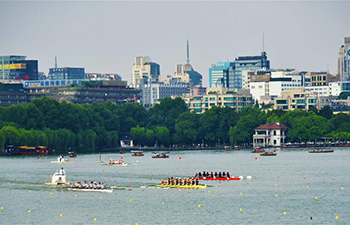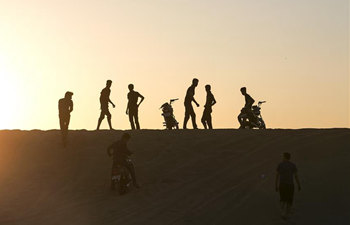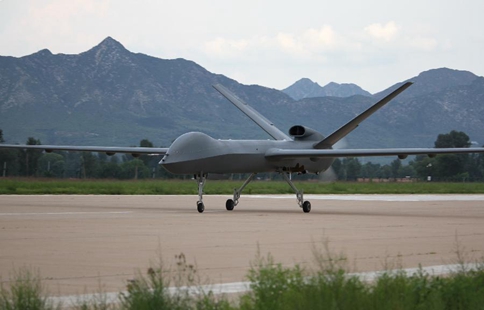by Mahmoud Fouly
CAIRO, July 22 (Xinhua) -- Fighting growing terrorism and reviving an exhausted economy represent two major interrelated challenges facing the most populous Arab country, Egypt, for both issues are two faces of the same coin.
Ongoing terrorist activities in Egypt dissuade a lot of foreign tourists and investors from visiting the country, whose undeveloped, marginalized and impoverished areas offer fitting hideaways for terrorists and provide them with a suitable source of recruits.
"Egypt faces today two decisive battles, which are confronting terrorism and achieving economic and social development," said Egyptian President Abdel-Fattah al-Sisi on Saturday while inaugurating the region's largest military base in the seaside city of Alexandria.
On the same day, an Egyptian court sentenced 28 to death over the 2015 car-bomb assassination of the country's top prosecutor. A day earlier, the Egyptian military announced killing 30 militants in restive North Sinai province bordering Israel and the Palestinian Gaza Strip.
The above is part of many terror attacks that killed hundreds of policemen and soldiers besides dozens from the Coptic minority, the anti-terror security campaigns that killed hundreds of militants and arrested a similar number of suspects, and the execution verdicts and lengthy jail terms handed to thousands of defendants over terror-related charges in the past few years.
Mohamed Kamal, political science professor at Cairo University believes that fighting terrorism and economic development are "surely interrelated," as the more stable a country get, the more investors and tourists it could attract.
He added that development limits the chances for terrorist operations and the recruitment of new terror elements, stressing that Egypt's current conditions require doing both counterterrorism and development at the same time.
A growing wave of terrorism started following the military ouster of former Islamist President Mohamed Morsi in July 2013 and the later deadly crackdown on his loyalists, mostly from the now-outlawed Muslim Brotherhood group.
Most of the terror operations were claimed by a Sinai-based group loyal to the regional Islamic State (IS) militia, which scared off tourists and investors who initially deemed Egypt as a favorable destination.
The authorities in Egypt are trying to combine both security confrontation and ideological approach during the country's anti-terror war declared by President Sisi, who was then the army chief, following Morsi's removal four years ago.
"Facing terrorism has different tools, as President Sisi said today, including the use of law, military force, ideological approach and others. All these tools must be used together within a comprehensive, integrated strategy," said Kamal.
The U.S. Department of State issued earlier in July a travel alert warning its citizens from visiting Egypt "due to threats from terrorist and violent political opposition groups." The warning added that "terrorist attacks can occur anywhere in the country."
Although Egypt and the United States are allies and their ties greatly improved under Sisi and his U.S. counterpart Donald Trump, the alert wording bothered the Egyptian leadership and the Egyptian foreign ministry rejected it in a later statement.
It is viewed that if a top ally like the United States warns citizens from visiting Egypt, the warning is practically extended to tourists and businessmen and its echo may reach other Western states as well.
Egypt's security conditions are improving, as the security forces are engaged in a fierce battle with militants in North Sinai, the air forces foil militant infiltration attempts at Egypt's western borders with eastern Libya and the police constantly arrest or gun down suspects over terror charges.
However, the sound of sporadic attacks on security checkpoints and recently on some churches is still loud, causing recession in the sectors of tourism and foreign investment that are vital for boosting the country's economy.
Some experts believe that there should be an ideological approach of combating terrorism besides anti-terror security campaigns, while others believe that reason can only work with extremists, not terrorists.
"There is a big difference between fighting terrorism and fighting extremism. Every terrorist is an extremist but not every extremist is necessarily a terrorist," said Mohamed Gomaa, researcher at the Arab and Regional Unit of Cairo-based Al-Ahram Center for Political and Strategic Studies.
"We cannot face extremism with security, military and legal means and we cannot face a terror gun in a battlefield with reason, but we can face extremism with reason," the researcher told Xinhua.
Egypt's tourism declined by half over the past few years, amid growing budget deficit, rising inflation and increasing foreign and domestic debts, which led the country to resort last year to a three-year economic reform plan based on austerity measures like cutting down spending and subsidies, reducing imports and increasing production.
The price hikes resulting from fuel and energy subsidy cuts and the local currency full floatation that more than doubled the U.S. dollar exchange rate against the Egyptian pound greatly affected the lives of low-income people nationwide.
"Marginalized societies are an easy prey to extremist thought," said Gomaa, emphasizing that economic development, political reform and enhancement of the state cultural and social roles make the country's anti-terror strategy more effective.
Egypt's economic reform plan is hailed and encouraged by a 12-billion-dollar loan from the International Monetary Fund, whose first tranche of 2.75 billion was delivered in November 2016 and the second of 1.25 billion in July 2017.

















